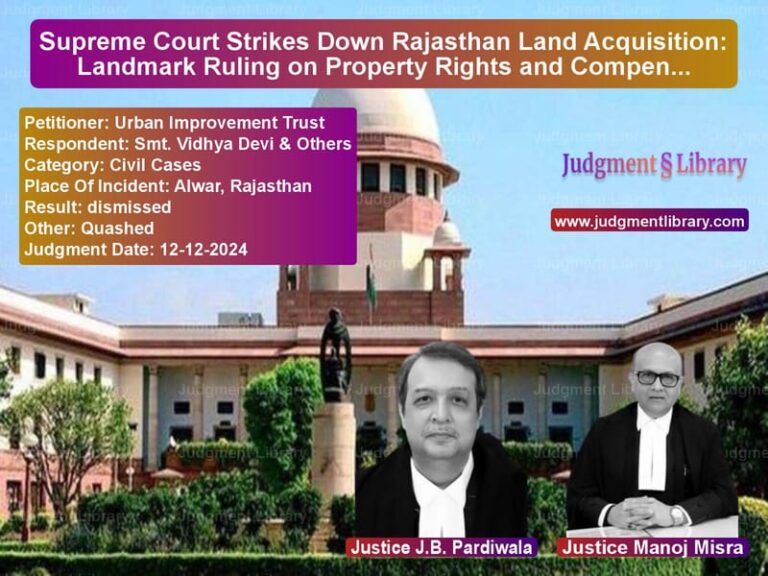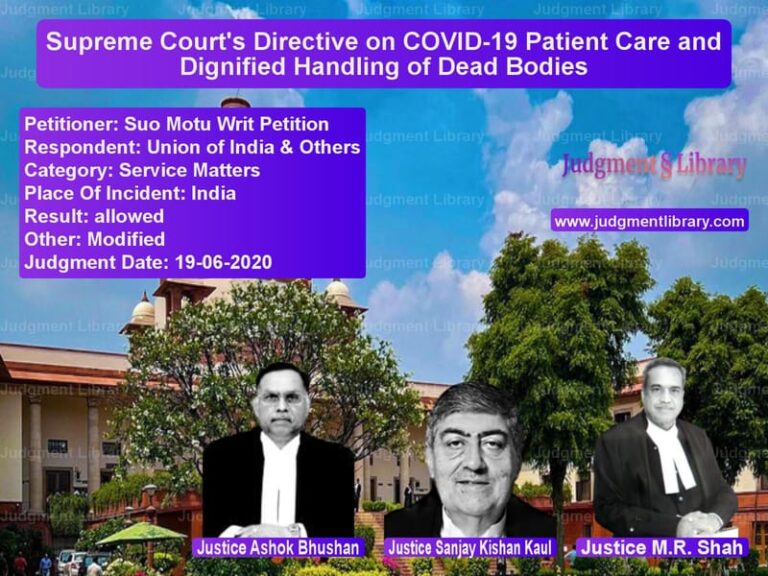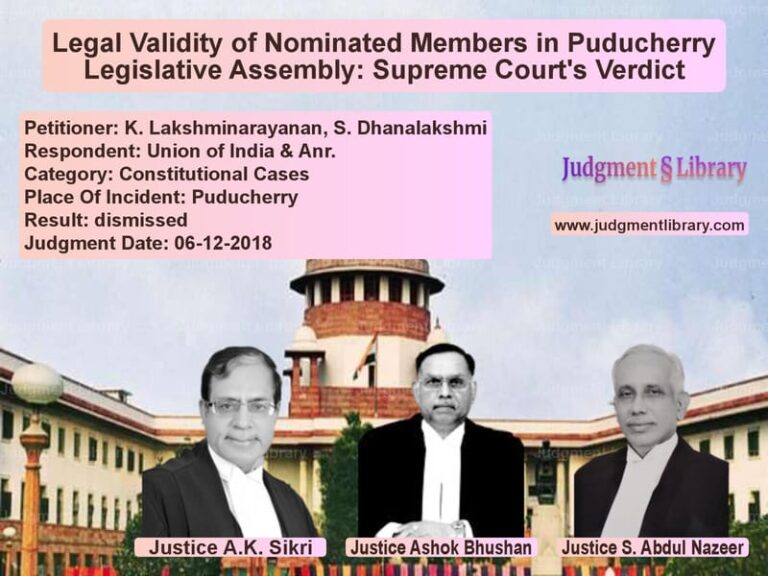Supreme Court Directs Transfer of Land Dispute Suit to Bengaluru Jurisdiction
The Supreme Court of India recently adjudicated a significant land dispute case involving Future Sector Land Developers LLP and Bagmane Developers P. Ltd. The case revolved around the jurisdictional appropriateness of filing a suit in Pune when the properties in question were located in Bengaluru. The Court ruled that the suit should be presented before the appropriate court in Bengaluru, reinforcing the principle that property-related disputes must be filed in the jurisdiction where the property is situated.
Background of the Case
Future Sector Land Developers LLP, the appellant, had filed a civil suit in Pune against 141 defendants, seeking various reliefs concerning land transactions in Bengaluru. The suit included declaratory and injunctive reliefs regarding agreements executed between the parties. Among the defendants, some filed applications under Order VII Rule 10 and Order VII Rule 11 of the Civil Procedure Code (CPC), arguing that the suit should be transferred to Bengaluru courts since the properties in question were located there.
The trial court in Pune dismissed the applications, prompting the defendants to approach the Bombay High Court. The High Court ruled in favor of transferring the case to Bengaluru, a decision that the appellants challenged in the Supreme Court.
Arguments by the Appellant (Future Sector Land Developers LLP)
- The suit primarily sought to enforce contractual rights rather than determine property rights.
- The agreements included a clause granting exclusive jurisdiction to Pune courts.
- The appellants were granted leave under Order II Rule 2(3) CPC to seek additional reliefs related to the property at a later date.
Arguments by the Respondents (Bagmane Developers P. Ltd. & Others)
- The reliefs sought by the appellants directly affected the ownership and possession of immovable properties in Bengaluru.
- Under Section 16 of CPC, suits concerning immovable property must be filed in the jurisdiction where the property is located.
- The appellants were attempting to manipulate jurisdiction through strategic drafting of the plaint.
Supreme Court’s Analysis
The Supreme Court examined the plaint and determined that:
- The reliefs sought were not merely contractual but directly impacted property ownership and possession.
- Section 16(d) CPC mandates that suits regarding the determination of rights in immovable property be filed where the property is situated.
- The appellants’ claim that they would file a separate suit for possession in the future contradicted their assertion that the current suit was purely contractual.
- The inclusion of a jurisdiction clause in the contract could not override statutory provisions concerning territorial jurisdiction.
The Court referenced the proviso to Section 16 CPC, stating:
“A suit to obtain relief respecting, or compensation for wrong to, immovable property held by or on behalf of the defendant may be instituted either in the court within whose local limits the property is situated or in the court within whose jurisdiction the defendant resides, provided that the relief sought can be entirely obtained through the personal obedience of the defendant.”
The Court found that the reliefs sought in the suit could not be enforced solely through personal obedience but would require intervention concerning the immovable properties, necessitating jurisdiction in Bengaluru.
Final Judgment
The Supreme Court ruled as follows:
- The Bombay High Court’s decision to transfer the suit to Bengaluru was upheld.
- The order allowing the application under Order VII Rule 10 CPC (return of plaint for filing in the appropriate court) was confirmed.
- The portion of the order that allowed the application under Order VII Rule 11 CPC (rejection of plaint) was set aside, clarifying that the appellants were still entitled to file the suit in Bengaluru.
- The appellants were given four weeks to represent their suit before the appropriate court in Bengaluru.
Implications of the Judgment
This ruling reinforces the principle that suits concerning immovable property must be filed where the property is located. It prevents forum shopping and ensures that disputes are adjudicated within the jurisdiction most relevant to the subject matter. The decision also upholds the integrity of procedural law, ensuring that parties cannot manipulate jurisdiction through strategic drafting of claims.
By affirming the territorial jurisdiction of courts in land-related disputes, the Supreme Court has set a precedent that will guide future litigation in real estate and contractual disputes involving immovable property.
Petitioner Name: Future Sector Land Developers LLP.Respondent Name: Bagmane Developers P. Ltd. & Ors..Judgment By: Justice V. Ramasubramanian, Justice Pankaj Mithal.Place Of Incident: Bengaluru.Judgment Date: 01-03-2023.
Don’t miss out on the full details! Download the complete judgment in PDF format below and gain valuable insights instantly!
Download Judgment: future-sector-land-d-vs-bagmane-developers-p-supreme-court-of-india-judgment-dated-01-03-2023.pdf
Directly Download Judgment: Directly download this Judgment
See all petitions in Contract Disputes
See all petitions in Property Disputes
See all petitions in Specific Performance
See all petitions in Judgment by V. Ramasubramanian
See all petitions in Judgment by Pankaj Mithal
See all petitions in partially allowed
See all petitions in Modified
See all petitions in supreme court of India judgments March 2023
See all petitions in 2023 judgments
See all posts in Civil Cases Category
See all allowed petitions in Civil Cases Category
See all Dismissed petitions in Civil Cases Category
See all partially allowed petitions in Civil Cases Category







